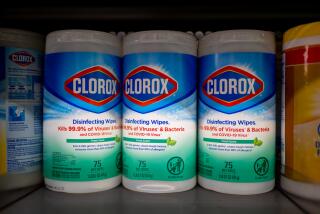Key Source of Flu Vaccine Shut Down
- Share via
The United States is facing the flu season with half the expected supply of vaccine because a company said today it was halting shipments.
Chiron Corp. announced the decision after health officials in Britain closed production there because of contamination problems.
Loss of the vaccine “poses a serious challenge to our vaccine supply for the upcoming flu season,” the U.S. Department of Health and Human Services said in a statement.
HHS said it anticipates having 54 million doses of vaccine from Aventis and 1 million to 2 million doses of FluMist nasal spray. The agency had planned for a supply of about 100 million doses this season, after a demand of about 87 million doses last flu season.
HHS Secretary Tommy Thompson said at a news conference today that the federal government is proceeding with contingency plans to make the vaccine available to people “who are the most vulnerable.”
“The Chiron news does not affect the vaccine supply for the major CDC-recommended pediatric group,” children 6 months to 23 months, Thompson said.
That vaccine is produced by another company, Aventis.
A team of scientists is going tonight or Wednesday to London to meet with officials there to discuss the problems at Chiron.
“This is serious, but we are on top of it,” Thompson said.
The government was not unprepared because it knew Chiron might not meet its production goals, though it did not know about the specific situation, Julie Gerberding, director of the Centers for Disease Control and Prevention, said at the news conference.
She said the CDC estimates that 180 million people would benefit from flu vaccines. But based on the numbers of people who in the past have gotten the vaccine, the CDC expects the available drugs “will come close to meeting the demand.”
“We will have to be very careful and parsimonious” in distributing the vaccine, she said.
Vaccine should be reserved for babies and toddlers ages 6 months to 23 months; people 65 or older; anyone with a chronic condition such as heart or lung disease; pregnant women; nursing home residents; children on aspirin therapy; healthcare workers who care for high-risk groups; and anyone who cares for or lives with babies younger than 6 months.
Jonathan Fielding, Los Angeles County’s public health director, called the halt on vaccines from Chiron “a serious problem” for the county, which last year gave out 130,000 flu shots — all using the company’s Fluvirin vaccine.
“It’s going to be critical in my view to prioritize who gets these,” Fielding said of the remaining vaccine. “We need to work everybody to make sure at least those at highest risk are immunized.”
Fielding said his department will start a heavy campaign to promote hand-washing as a way to prevent the spread of germs. Other options include school closures “depending on the circumstances,” he said.
Emeryville, Calif.-based Chiron said none of the 48 million doses of its Fluvirin vaccine destined for U.S. outlets had been distributed, and that a recall would not be necessary.
In Britain, where Chiron has about 20% of the flu vaccine market, the company will replace Fluvirin with other vaccines approved for use in the United Kingdom but not in the United States.
“Chiron deeply regrets that we will be unable to meet public health needs this season,” company President Howard Pien said in a statement. “Chiron believes in the value of influenza vaccination, and we are committed to taking all necessary actions to ensure an adequate vaccine supply for the 2005-2006 influenza season.”
The company said that British health regulators suspended its license to manufacture Fluvirin for three months at a plant in Liverpool after determining that the company’s manufacturing process “does not comply with UK Good Manufacturing Practices regulations.”
In August, similar concerns raised by British health authorities forced the company to destroy 4 million doses of the vaccine and delay shipments by one month.
In late September, Chiron said it anticipated that it would start shipping Fluvirin to health facilities in early October after addressing what it considered were isolated problems. But after reviewing company test data and manufacturing methods, the British Medicines and Healthcare Products Regulatory Agency suspended the Liverpool facility’s license to make the vaccine.
“No assurances can be given that additional issues with respect to Fluvirin or Chiron’s manufacturing generally will not arise in the future or that the MHRA will not further suspend or revoke the license to Chiron’s Liverpool facility,” the company said in a statement.
Chiron entered the U.S. flu business a year ago with the acquisition of PowderJect Pharmaceuticals of Oxford, England, making Chiron one of this country’s two primary flu vaccine makers.
The company said that halting flu shipments will slash its profits by about half this year. On Wall Street, Chiron shares plunged more than 17% on the Nasdaq. Trading in the stock had been temporarily suspended in the morning.
Public awareness of influenza increases every year, said Martin Blaser, who chairs the department of medicine at New York University’s medical school and is president-elect of the Infectious Disease Society of America. He noted that in an average year, 35,000 to 40,000 people die of the flu.
“One of the things that we’re concerned about is that there’s no big national policy on influenza. It hasn’t moved to the center of the agenda,” he said.
Times staff writers Jai-Rui Chong and Julie Tamaki and Associated Press contributed to this report.
More to Read
Inside the business of entertainment
The Wide Shot brings you news, analysis and insights on everything from streaming wars to production — and what it all means for the future.
You may occasionally receive promotional content from the Los Angeles Times.











